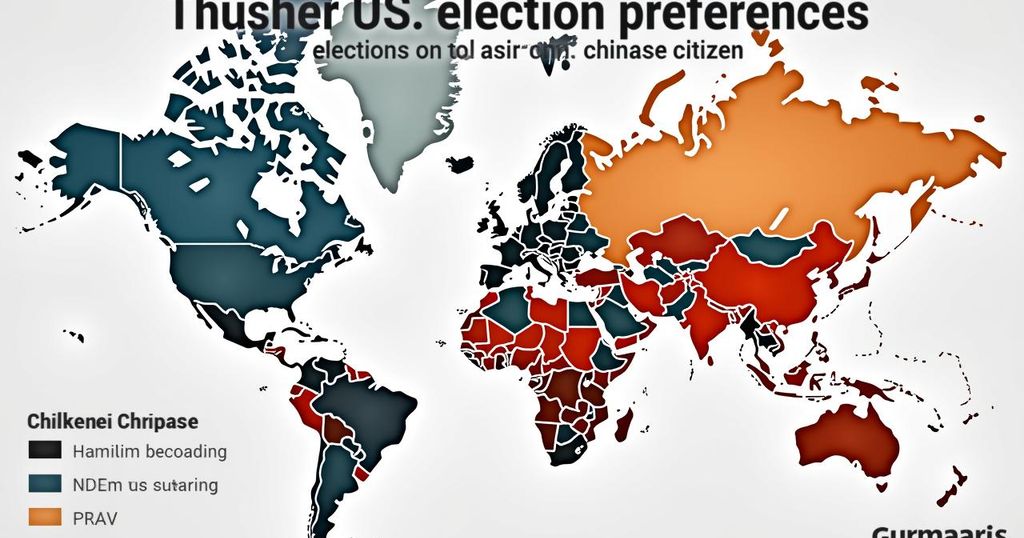Chinese Perspectives on the U.S. Presidential Election: Harris or Trump?
Chinese citizens are closely observing the U.S. presidential election due to concerns over its implications for Sino-American relations, particularly regarding Taiwan, trade, and military conflicts. Their views on Donald Trump and Kamala Harris illustrate a mix of anxiety over potential war and hopes for stability. The younger generation expresses a desire for cultural exchanges, suggesting a willingness to foster better relations despite political tensions.
In China, there is considerable interest and anxiety regarding the upcoming U.S. presidential election, with many citizens aware of the potential ramifications for Sino-American relations. This election is perceived as crucial, occurring during a time of heightened tensions concerning issues such as Taiwan and trade. Mr. Xiang, a retiree, expresses the sentiment prevalent among many, stating, “None of us wants to see a war,” as he participates in a communal dance at Ritan Park, close to the U.S. embassy. Numerous individuals are concerned about the increasingly volatile relationship between the two nations. Mr. Meng, a senior citizen, articulates his preference for a Trump presidency, believing that “Although he imposes economic sanctions on China, he does not wish to start or fight a war.” This perspective is contrasted by other citizens who express skepticism towards both candidates, particularly with Harris, whom they view as similar to President Biden regarding foreign policy. Recent declarations from Chinese state media highlight the country’s emphasis on diplomatic resolutions and peace, further intensifying local apprehensions about potential conflicts—be it between China and the U.S. or wars in the Middle East and Ukraine, which Mr. Meng believes reflect negatively on Biden’s leadership. The topic of Taiwan emerges as a significant concern among Chinese citizens. A father expresses his fears about potential military conflicts over Taiwan, which China’s leadership considers integral to national sovereignty. In juxtaposition, Trump’s rhetoric suggests a transactional view of U.S. support, advocating that Taiwan should bear the financial burden of its defense. This raises alarm among Chinese observers, especially with Trump’s historical inclination towards taxation on Chinese imports, which many see as detrimental to both nations’ economies. Young people in China, however, are not immune to feelings of optimism. They express their admiration for culture exchanges with the U.S., and while being proud of their national identity, they simultaneously look toward American cultural influences. Young individuals like Lucy envision a future where mutual understanding prevails through personal connections and international exchanges. Despite the backdrop of anxiety and uncertainty, they hope for more people-to-people exchanges, counteracting the recent declines in U.S.-China student interactions, which have dwindled significantly in past years. This sentiment reflects a desire for a nuanced relationship, balancing competition with cooperation. Lucy’s hope to promote Chinese culture in America signals a yearning for deeper connections, which remains a hopeful note amidst the complex dynamics of U.S.-China relations.
The article discusses the perspectives of Chinese citizens regarding the forthcoming U.S. presidential election, highlighting their concerns about the potential impact on Sino-American relations. The tensions surrounding Taiwan, trade, and military conflicts are focal points in their discourse. The contrasting views on Donald Trump and Kamala Harris reveal a blend of anxiety regarding war and a desire for stability in international relations. The dialogue around cultural exchanges and the hope for better understanding between citizens of both nations adds a layer of complexity to their views on the presidential candidates.
In conclusion, the anxiety among Chinese citizens regarding the U.S. presidential election reflects their fears of escalating conflicts and economic repercussions, particularly related to trade. While opinions vary regarding Trump and Harris, many citizens express a desire for peace and stability, particularly concerning Taiwan. There remains a glimmer of hope among the younger generation for cultural exchanges and improved mutual understanding, highlighting the complex relationship that transcends political rhetoric.
Original Source: www.bbc.com








Post Comment